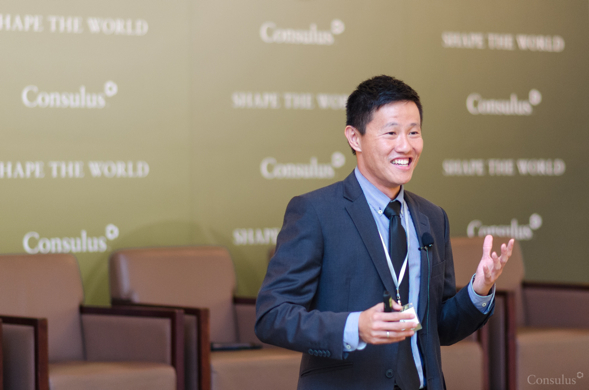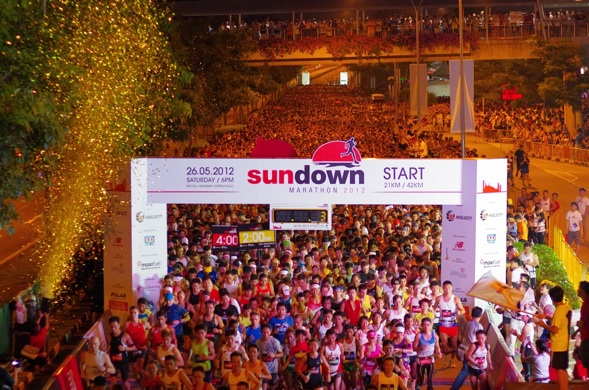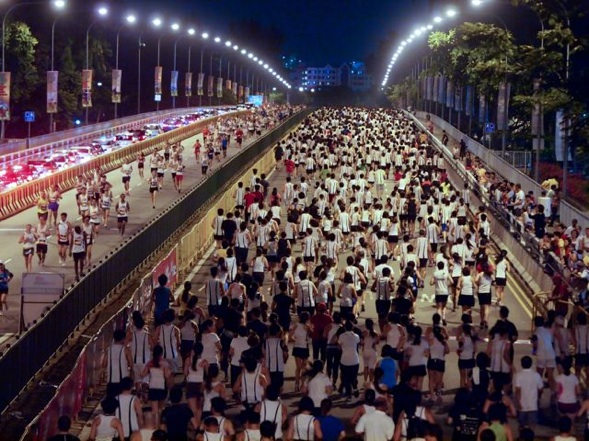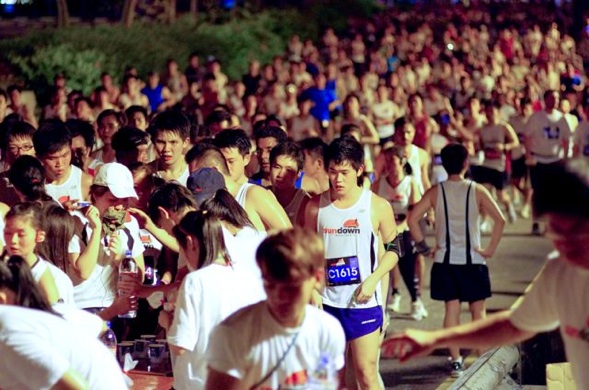Adrian is an accomplished athlete and an endurance sports enthusiast. Channeling his passion into the sports business, Adrian brought the Aviva Ironman 70.3 into Singapore and also conceptualised the first night marathon in Singapore, the Sundown Marathon, which is into its 5th year running. HiVelocity, the company started by Adrian, is now the leading sports agency in Singapore and has expanded into retail and e-services. Adrian talks about the fire in his belly and the importance of good business acumen.
The Columnist (TC): We notice a growing number of sporting events in Singapore. Why do you think this is happening?
Adrian Mok (AM): It certainly has to do with the status of a nation and how a nation develops. Singapore has come a long way since we were a developing country to where we are now – from the third world to the first. With this shift, it brought about new social elements – Sports has become essential. One must first earn enough money to meet his or her basic needs. Once basic needs are met, the next focus would be on health. Furthermore, 2002 was a pivotal period for the sporting industry; Standard Chartered Bank held their first marathon. Prior to that, sporting events were executed very amateurishly – small scale and only attracted a small group of people (the hardcore racers) and not the masses. So when Standard Chartered came on board, with a big sponsor like themselves pulling in all the advertising dollars, it suddenly seeded an interest in everybody’s mind. Especially so in the corporate world where Standard Chartered certainly has an impact. Since their first marathon, big increments in participation numbers have seen a jump from 6,000 participants to 60,000 today! A big portion of funding also came from the Singapore Sports Council to help make this event happen.
TC: What inspired you to organise sporting events?
AM: It wasn’t by design that I started an events business. I started my first business trading in sporting products. And that was a very natural move because I was previously working in the same capacity as an employee for other companies; in the trading of sporting goods. But I knew this industry well and that’s how it led on and developed into running sports events. My events business started with a group of friends who took part in an Iron Man event. We remember saying after the race that the event was poorly run and that if we had a chance to run it ourselves, we would’ve done a better job. That idea stuck in my head for a long time and soon became a burning desire to make it happen. So in the years to come, we were really focused on making events successful. Of course there were many challenges and much hardship in the first few years but we eventually made it work. I think that track record again helped garner that momentum that subsequently followed for all the rest of the events that we picked up along the way. Today the company organises about 15 events per calendar year.
TC: We assume you leveraged on your personal contacts to start your business since you have raced professionally for Singapore for many years. Is it important for those who want to start a business to build up their social capital (i.e. networks)?
AM: Yes, but it’s not the most important thing to have. The most important thing to have is passion – with that you also have tenacity. A bit of luck is also involved. At the start we had to reach out to the Iron Man brand owners, WTC, to obtain the license to operate in Singapore. So we wrote to them in the US and of course they ignored us because we were nobodies. I was blessed to meet an Australian partner who happened to come to Singapore seeking a partner who could organise events. The Australian partner had tried to reach out to the Singapore Sports Council and the Triathlon Association previously. But strangely, both organisations pointed him to me. I don’t know why though. Perhaps it was because I ran a few events before, perhaps it was my character or my standing with the sports industry and knowledge but till today I still have no idea why they did that!
TC: How did suppliers react at first, when you first approached them on starting a sporting events company?
AM: We had to find a sponsor and so we went to look up Aviva and pitch to them. At that point of time they had already sponsored other triathlon events and they were very experienced and knowledgeable about the triathlon scene. To make things tougher, we were nobodies in the events scene. Aviva knew we did not have the track record. In fact, there was also a competitor at that time who said to Aviva that we didn’t have the expertise and that they were in a better position to execute the event. But we went in saying ‘Although we don’t have a track record, we are absolutely passionate to do this’. We were very prepared – we went through in depth the proposal, the details, and everything that went into the event. This is one of the pitches that I will never forget. I remember telling them ‘Look here, I’m asking for one chance to do this…’ I think we won their hearts that day. They’ve since became sponsors for the next 6 years.
TC: What advice would you give to people who do not have the necessary social capital or networks?
AM: I asked myself if I were to hire somebody, would the person need to have the prerequisite of having sports experience or being a sports person? It’s always a good to have, but having good business acumen is more important. Having sports experience or being a sports person with no good business acumen will be worse than someone without sports experience but with good business acumen. So even if you want to start a business in the sports industry but do not have the related connections, a good prerequisite should be the correct training and proper understanding of business, followed by the knowledge of the particular industry. And honestly, attaining knowledge is easy. With a burning desire, one would be able to learn everything there is about a particular industry. You will know who the major players are, what are the pricing points, and so on. It is this type of information, that when you lead a business discussion, where people then put their trust in you. Not so much because you have done sports before.
TC: How much of a disadvantage is the absence of a network of suppliers for business startups?
AM: Networks and connections do not come to you. It is not a given unless the networks are inherited from your family. For everybody else, I believe it is a level playing field. But it is the passion that drives a person to get in contact with the relevant network and connections. If you keep knocking on people’s doors, they will eventually let you in because they realise that you’re very passionate about what you want. I think passion points you in the right direction. Tenacity is very important.
TC: Have there been good ideas that come about from collaboration with other brands and/or suppliers?
AM: Yes. Firstly, I pride my business on my own team – my team is definitely one of the hardest working teams around in this industry. We always seem to give in to very tough requests from clients. I’m not citing other companies but many other businesses would have said that the requests we took would not have be able to be completed within the given timeframe. But my team would will always try to bend
backwards and see if we can do it. Even if the idea if wild and crazy, we will try. I think its about attitude. It is in our DNA. We believe that everything that we do has to be good, we have to be the best, and we try to make a legacy out of it. And it’s really the attitude and belief. That’s why we go through every single detail and thats also why it cascades down to all members of the team. If you want to do something, do your best, give absolutely your all, otherwise don’t do it at all. There are no shortage of ideas, but the truth is that here in Singapore, we are very much limited by space. It’s getting very competitive though, and we are constantly trying to differentiate ourselves and think out of the box to deliver a different experiences instead of just delivering an event.
This interview was conducted for The Columnist, a newsletter by Consulus that offers ideas on business, design and world affairs. The views expressed in this article are those of the interviewee and do not necessarily reflect the views of Consulus.







